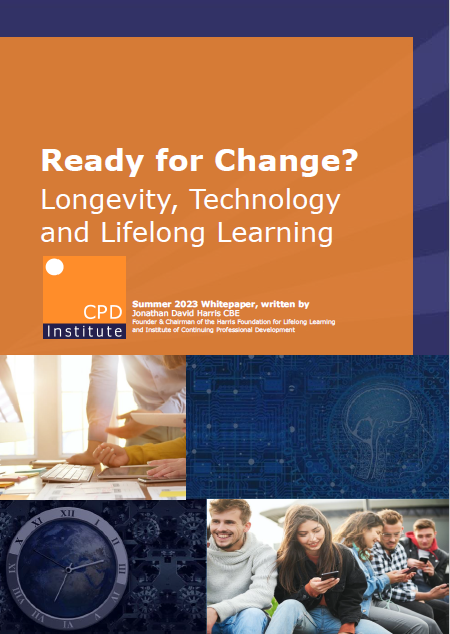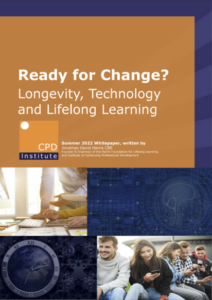
Today, our society faces numerous pressures. This paper tackles two issues in particular: longer life expectancies and the rapid advancement of technology.
Today, our society faces numerous pressures. This paper tackles two issues in particular: longer life expectancies and the rapid advancement of technology. Both of these are challenges in their own right. They also intertwine – interacting with each other and in some instances magnifying each other’s effects. How can we deal with these two issues and ensure that we are prepared for the future?
There is one concept that is shared time and again in the literature as a possible part of the solution. To keep up with the pace of technological change, to deal with increasing life expectancies, to find new ways to thrive… we need to update our skills and we need to keep learning, throughout our lives.
This message, on the face of it, might seem to be directed at older generations – those who are already living the reality of an extended life whilst also being considered ‘digital immigrants’. In truth, however, it is relevant to all of us – young and old.

Today, our society faces numerous pressures. This paper tackles two issues in particular: longer life expectancies and the rapid advancement of technology.
Today, our society faces numerous pressures. This paper tackles two issues in particular: longer life expectancies and the rapid advancement of technology. Both of these are challenges in their own right. They also intertwine – interacting with each other and in some instances magnifying each other’s effects. How can we deal with these two issues and ensure that we are prepared for the future?
This message, on the face of it, might seem to be directed at older generations – those who are already living the reality of an extended life whilst also being considered ‘digital immigrants’. In truth, however, it is relevant to all of us – young and old.
Lifelong learning is about how we relate to each other and work together. It is about how we participate in society together. It is in everyone’s interests that we all keep ourselves ‘up to speed’ with the changes going on around us. These days, those changes so often involve technology – whether it is the cause, itself, of change or the solution to it.
Looking around us today, technology is reaching into every area of daily life. From the smartphones that keep so many of us connected, to smart technology in our homes and workplaces. As our population lives for longer, we will need to use these technologies for longer, and we will see them evolve over longer periods of time. They will evolve and we must too – or at the very least, our knowledge-base must.
Our education system and institutions undoubtedly have a role to play here. However, learning, and doing so over the duration of our lifetimes, is not just about the classroom. It can take place anywhere, in any environment.
As we get older, learning in all its forms will help to keep us in employment for longer, it will support our health and our ability to age well, and it may even see an end to the concept of ‘retirement’ as we know it. A lifetime of learning offers many possibilities. So, how can we reap the rewards of this approach in the face of the challenges ahead?
As a starting point we, as a society, can benefit from changing our perception of education and learning. Each of us, supported by the right infrastructure, services and public policies, can choose to take a ‘little and often’ approach, step-by-step over time, as we go about our daily lives.
Also, we can seek to create learning opportunities for those around us. Lifelong learning is, after all, a way of life as much as anything; it is a mindset. If we can stay interested in the world around us, preserve our curiosity, share our knowledge, then I believe we will be well on our way to a rewarding future.
Founder & Chairman of the Harris Foundation for Lifelong Learning and Institute of Continuing Professional Development